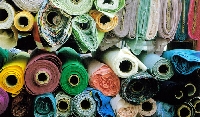How to care for organic clothing
By Catalogs Editorial Staff

Five Eco-Friendly Tips for Cleaning and Preserving Organic Fabrics and Clothing
Natural fabrics, organic textiles and eco-apparel have become a major trend in the world of fashion and home decor. From organic cloth baby diapers to all natural children’s clothing, eco-friendly bedding and household upholstery, even natural cleaning products and skin care lines, it’s no secret that there has been a tremendous consumer shift in favor green products.
Why switch to organic, eco-friendly fabrics and organic clothing care? To begin with, standard cotton production and processing typically incorporates pesticides, insecticides and herbicides, and thus produces waste that pollutes water and land. Anyone making the choice to purchase organic fabrics is essentially taking a stand against the companies that use chemicals in the production and processing of cotton.
Other fabrics such as polyester, rayon and nylon are engineered from a petroleum base. In addition to poisoning the environment during manufacturing, these petroleum based products can poison human skin, increasing the risk for allergies, skin diseases, and even cancer. Last but certainly not least, many of these manufactured, synthetic fabrics are produced in sweatshops by impoverished workers in third world countries.
Although eco-fabrics may cost a bit more, they are typically higher quality garments that will last longer, wear well and look beautiful. Ultimately, opting to invest in organic fabrics is a healthier choice for our environment, our economy, as well as our own bodies, and the health of our families. Organic baby clothes, bedding and other textiles are especially appealing for the delicate and vulnerable skin of children. Some examples of eco-fabrics and organic textiles include organic cotton, linen, hemp, soy cloth products and bamboo textiles.
If you plan to purchase eco-fabrics, organic fabrics, and clothing made from natural fibers, however, it is helpful to understand how to best care for organic clothing. Certainly you will want to avoid heavy industrial detergents or other cleaning products that could potentially cause damage. To ensure that your fabrics are long lasting, as well as bright, crisp and fresh looking, it is vital to practice organic clothing care.
Organic Clothing Care:
Five Eco-Friendly Tips for Cleaning and Preserving Fabrics and Clothing
1. Consider washing your organic fabrics by hand. If hand washing is not possible, practice organic clothing care by washing your fabrics on the gentle cycle using eco-laundry detergent or hypoallergenic eco-laundry disks, which soften the water, and are more economical because they are reusable, lasting for up to one hundred loads of laundry.
2. Use only organic or eco-friendly cleaners, soaps and detergents. Ask your local health food store for recommendations. The best tip for selecting organic detergents is to seek out products without phosphates, dyes or fragrances.
3. Forgo those fabric softeners and perfumed detergents that contain chemicals and pollutants. Instead, add natural lavender water, rose water or lemon juice to the water in the washing machine, or the tub where you hand wash your clothes. Lemon juice can also act as a natural bleach and stain remover/stain lightener, for white clothes. Natural laundry products are gentler for both organic baby items and for your baby’s skin.
4. Dryer sheets also contain chemicals and pollutants. Save money on dryer sheets and instead toss a ball of aluminum foil into your dryer to help reduce static cling.
~
5. Often, organic cotton, which contains only 100% pure cotton, is more likely to shrink on hot settings in the dryer. To avoid this problem, be sure to hang dry your organic cotton clothing. This will also save you energy costs associated with running your dryer. When possible, hang dry your organic fabrics outdoors on a laundry line. There is nothing quite like that clean aroma of fresh air.
When it comes to organic clothing care, it pays to recognize the products and practices that will make for a brighter and more beautiful future.
Resources:
Nature Moms: Why Go Organic
TLC Home: How Organic Clothing Works
Popular Savings Offers











